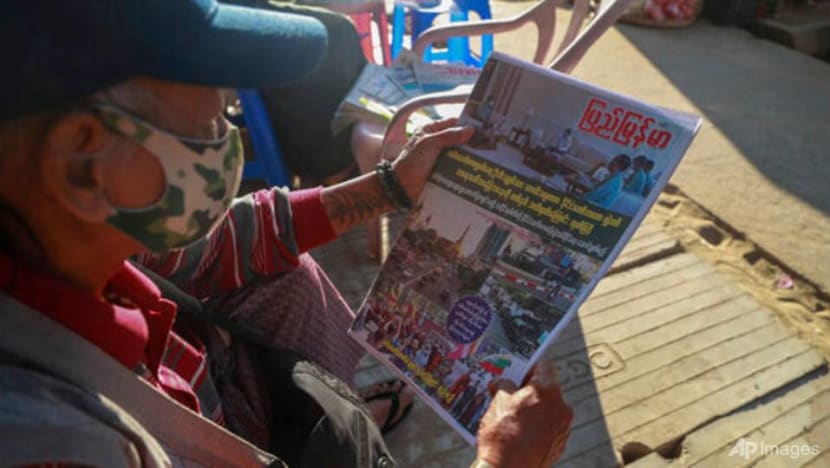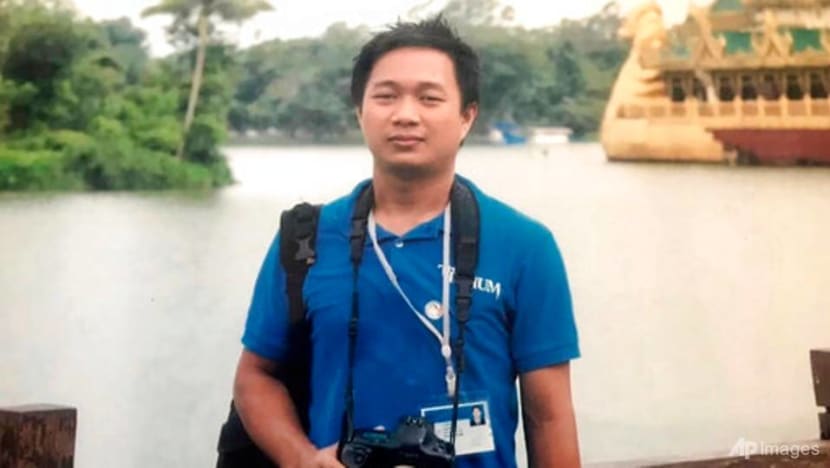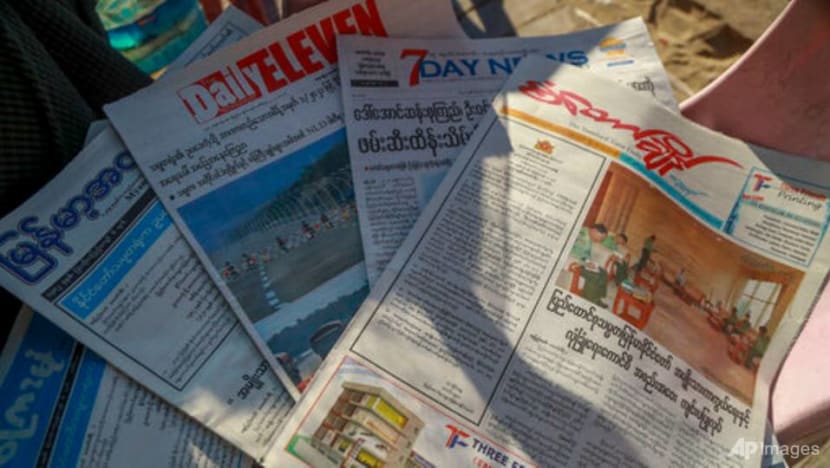Explainer: How is the Myanmar military cracking down on journalists covering the protests?

A man looks at a newspaper in Yangon, Myanmar, Feb 2, 2021. (Photo: AP)
BANGKOK: Myanmar's military-controlled government is cracking down on coverage of mass protests, raiding media companies and detaining dozens of journalists since its Feb 1 coup.
The crackdown comes as the military has escalated violence against mass protests and as independent media continue to cover the arrests and shootings by troops in cities across Myanmar. In some instances, journalists are using social media to get the information out.
READ: Myanmar junta charges 6 journalists, including AP photographer
How has the media landscape in Myanmar changed since the coup? Here's a look:
HOW IS THE GOVERNMENT SUPPRESSING NEWS?
Authorities raided the offices of Kamayut Media on Monday (Mar 8), detaining its co-founder, Han Thar Nyein, and editor-in-chief, Nathan Maung. Witnesses said seven military trucks were involved in the raid, according to a member of Han Thar Nyein's family. The military also raided the offices of Mizzima News.
A day earlier, five local outlets - Mizzima, DVB, Khit Thit Media, Myanmar Now and 7Day News - were banned from broadcasting or providing any information on any media platform or using any technology after their licenses were cancelled, state broadcaster MRTV reported. All had covered the protests extensively and often livestreamed video.
READ: How protesters in Myanmar get around social media and Internet blackouts
Myanmar Now, an independent news service, reported that police broke down the door of its office on Monday and seized computers, printers and parts of the newsroom’s data server. It cited unnamed witnesses and showed a photo of CCTV footage. But it said the office had been evacuated in late January.
Human rights groups and journalism organisations have condemned the attacks on freedom of the press.

HOW ARE INDEPENDENT MEDIA OUTLETS RESPONDING?
For now, they are vowing to press on despite the risks.
“What is certain is that we will not stop covering the enormous crimes the regime has been committing throughout the country,” said Swe Win, Myanmar Now’s editor-in-chief.
Mizzima, another privately owned, independent local news outlet, put out a statement on its website saying it “continues to fight against the military coup and for the restoration of democracy and human rights” using various online and multimedia platforms.
READ: 'Shoot till they are dead': Some Myanmar police say they fled to India after refusing orders
Other outlets also still reported on protests on Tuesday. Some media organizations are trying to operate from abroad.
WHAT KIND OF MEDIA ARE STILL LEGALLY OPERATING IN MYANMAR?
Myanmar seems to be reverting to its old system where officially sanctioned media are entirely state-controlled, as they were before August 2012.
Even before the coup, under the military-dominated, quasi-civilian government led by Aung San Suu Kyi, journalists faced arrest and harassment for reporting on sensitive topics such as abuses against its Rohingya Muslim ethnic minority.
Reuters journalists Wa Lone and Kyaw Soe Oo were given seven-year prison sentences, but later pardoned, for trying to investigate a massacre of Rohingya civilians.
COMMENTARY: Two freed journalists and the secret role Aung San Suu Kyi might have played
Myanmar ranked 139th of 180 countries in Reporters Without Borders' 2020 World Press Freedom index. Journalists often have faced criminal prosecution for online defamation.

The English-language Myanmar Times announced it had suspended all publications for three months beginning Feb 21. That move came after many of its staff quit to protest the paper's agreement to follow a junta order not to use the word “coup” to describe the military takeover.
Another state-controlled newspaper, the Global New Light of Myanmar, is still publishing. Other state media include the Myanmar News Agency and army-controlled Myawaddy TV.
READ: Coup chaos in Myanmar leaves employers fretting over paying staff
WHAT ARE THE LONGER-TERM RAMIFICATIONS?
Suppressing all reporting would require a complete blackout of all Internet and satellite communications. Apart from the legal and human rights implications, that would be a huge setback for the country's economy.
Myanmar's businesses are highly reliant on the Internet and on digital platforms like Facebook, having developed quickly in the past few years after decades of relative isolation under previous military governments.
So far, the junta has chosen to shut down Internet links at night, hindering but not completely stopping such communications. Because modern businesses rely heavily on the Internet and the free-flow of communication and information, the military's actions are further damaging a business environment already devastated by the coup and its aftermath.












